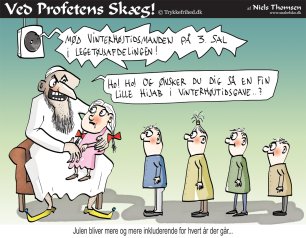'From the point of view of freedom of expression, everything is wrong with the Government's proposal for an “influence law”. A law which a large parliamentary majority will in all probability adopt within the next couple of weeks. The law intends to punish those who cooperate with foreign intelligence services in order to plant or disseminate information with the intention of influencing public opinion and political decision-making.
This means that completely legal statements and attitudes, such as resistance to the EU or NATO, will be made criminal and punishable by up to 12 years in prison - if made in connection with some form of cooperation with a foreign intelligence service.
It is in itself monstrous, because a legal expression (of opinion) is a legal expression - no matter who submits it and where it comes from, and in the Free Press Society we believe that the bill constitutes the biggest attack on freedom of expression since the censorship levied on Denmark during the occupation.
But why this need to restrict the Danes' most fundamental freedom?
The Ministry of Justice itself states in the remarks to the bill that it is to counter the threat of (Russian) misinformation, and it lists 11 examples with which they wish to illustrate the threat that we are facing.
Amongst the Ministry of Justice's examples of Russian misinformation are: the shooting of the Malaysian passenger aircraft MH17, Swedish / Ukrainian arms trade, the Lisa case (where a German girl was supposed to have been raped by 3 migrants), the bombing of a humanitarian convoy in Aleppo, the US presidential campaign, novichok and Skripal, chemical attack in Duma and a Russian television spot about Bornholm.
Common to the examples that are derived from an internal FE document, is that they are all used to justify the changing of the law, because it takes something pretty heavy-hitting in order to convince a skeptical audience - and here we are made to understand that we are facing a massive threat of orchestrated lies, misinformation and attempts to undermine public opinion.
Or do we?
There are many indications that all the examples collected by the Ministry of Justice and the FE are, in fact, an unsightly mishmash of "... undocumented or wrong postulates formed by the media, politicians and intelligence services."
That is in any case the conclusion of the report: "Truth and censorship in Denmark - a case study of the Danish government's 11 examples of Russian governance's influence operations in Denmark". The report, which can also be found on the Folketing's website, documents, for example, that the government's scare examples of Russian influence attempts is, at no point, backed up by concrete evidence, but rather in loose rumors, conspiracy theories and direct falsehoods, all of which seem due to an increasing fear of Russian expansion and a new cold war.
If the government wants to illustrate the Russian threat, then it is doing an exceptionally poor job of it, and it is very worrying that all of the examples that will now serve to justify such a massive restriction on Danish freedom of speech, cannot stand the rigors of a fact check.
Justice Minister Søren Pape even came up with another fake example when he, together with the Foreign Minister and the Minister of Defense, tried to emphasize the need for this new law at the launch of the proposal last September. Here the minister said:
“In other countries, we have seen examples of coordinated impact campaigns being perpetrated, including false information, in an attempt to influence the outcome of democratic elections. It is a very worrying development. We just have to look over the Sound. Prior to the 30th Swedish parliamentary elections on Sunday, the Swedish security authorities have noted several attempts to influence, in particular, the Swedes' confidence in the election itself and the democratic process in Sweden. "
This is not true. The fact is that the Swedish authorities, specifically the Swedish Emergency Management Agency, asked the British think tank, the Institute for Strategic Dialogue (ISD), to investigate which attempts at Russian influence had taken place in connection with the parliamentary elections in September. This resulted in a strange report entitled "Smearing Sweden", but ISD found no evidence to suppose that the Russians had tried to influence the Swedish election.
The Freedom of the Press is deeply concerned that we have a government that is so easily influenced by both loose rumors and false claims, and the ease with which they are willing to sell out of our most basic freedom - on a basis that seems to be entirely non- existent.
This is, however, exactly what is going on during these days - and in a few weeks it will be too late: Then all parties, except for the Unity List and SF (and perhaps DF (Danish Peoples Party) - it is still unclear) will vote yes to the greatest restriction to the Danes’ freedom of expression since World War II.



